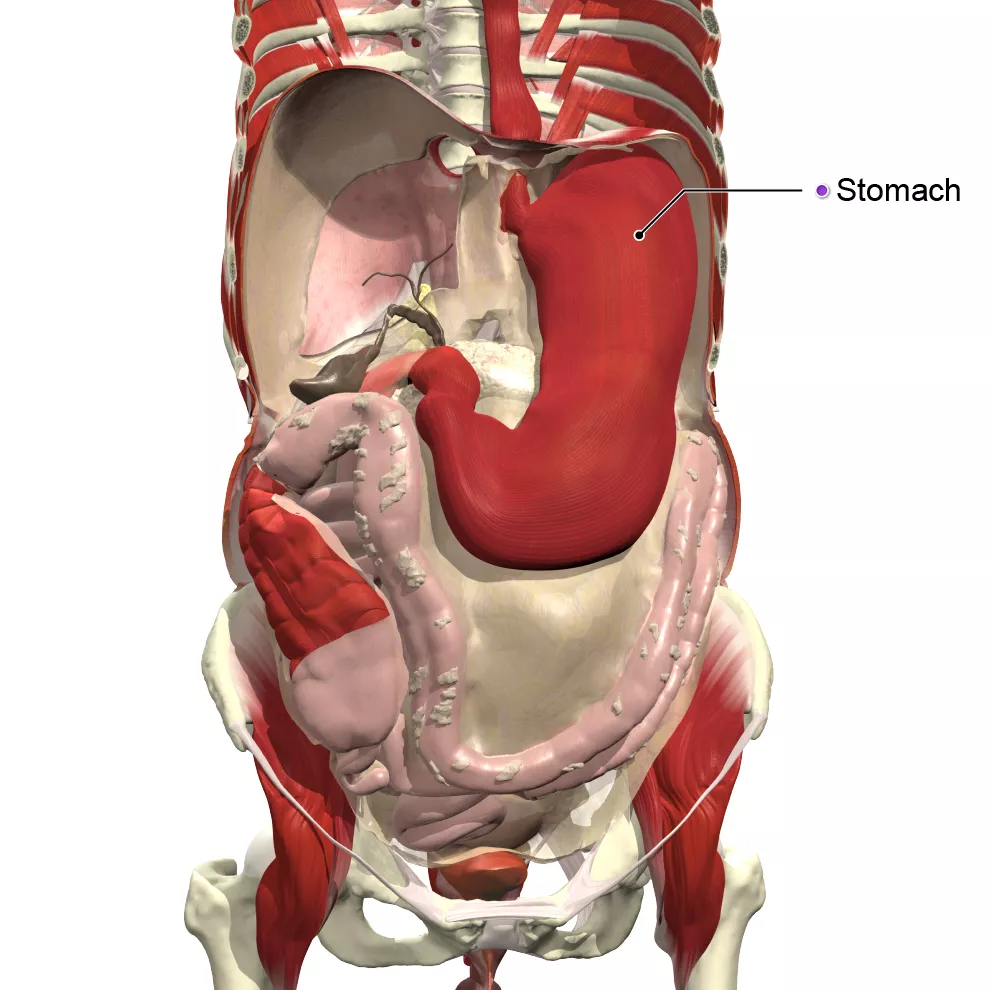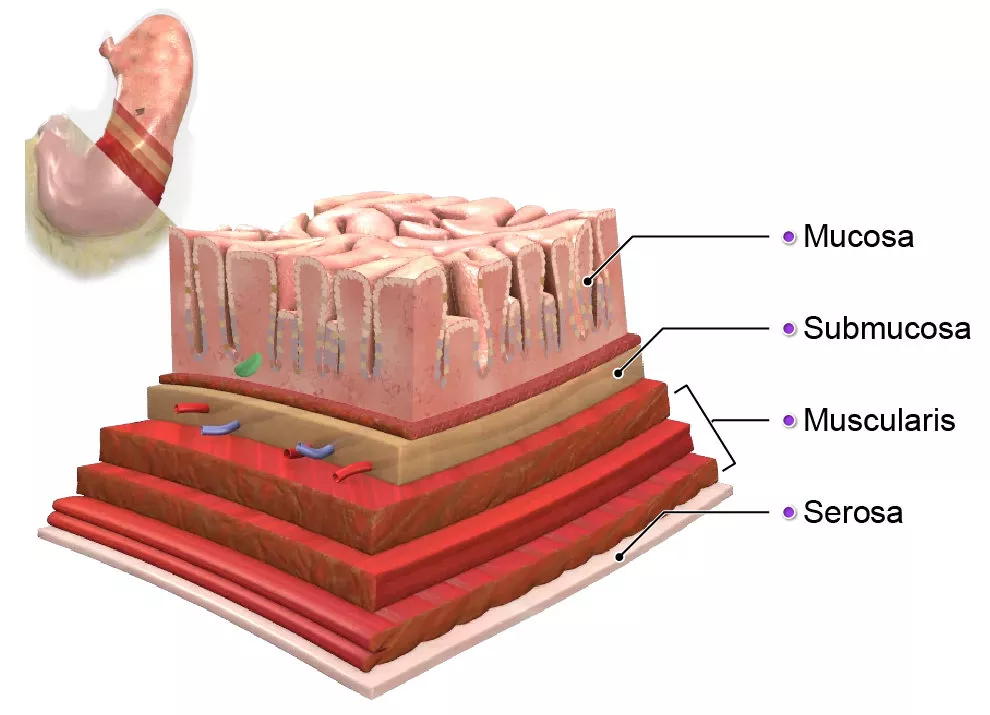While December and the holidays is a time for celebration, being with friends and family, and appreciating what you have, it is also a time of excess – alcohol, partying and lots and lots of food! Have you ever thought about what goes on inside your stomach to cope with all this extra food? If you have ever felt so full you might burst, then read on as we reveal the anatomy of the stomach and how it stretches when we eat, the consequences of overeating, and importantly how we can control our portion sizes and stay healthy.
Anatomy of the stomach
Your stomach is part of the gastrointestinal (GI) tract and the digestive system, and its function is to digest the food you eat. It is a large muscular sac, situated immediately below the diaphragm and to the left of the upper abdomen. It varies in size from person to person depending on when and how much you have eaten.

Structurally, your stomach is made up of tissue and several layers of muscle that can be broken down as below:
-
- Mucosa – The inner lining of your stomach that changes appearance after you eat. It’s covered in folds (small ridges called rugae) when empty, and these expand and flatten as your stomach becomes full.
- Submucosa – This covers and protects the mucosa and also contains nerve cells, lymph vessels, blood vessels and connective tissue.
- Muscularis – It has 3 layers and is the main muscle in your stomach that contracts and relaxes to break down food.
- Serosa – The main membrane that covers your stomach.

How the stomach digests food
Your stomach has three main functions during the process of digestion. First, the upper muscles of the stomach relax to let food enter. The food gets temporarily stored in the body of the stomach, ready to be broken down.
Food is then broken down into a semi-fluid pulp called chyme. Your stomach can hold up to four liters of chyme for up to four hours, depending on the type of food eaten and how muscular your stomach is.
Lastly, your stomach aids digestion by secreting gastric juices containing water, mucus, hydrochloric acid, intrinsic factor and the enzyme pepsinogen. Once this has happened food is then passed into the small intestine.
Which factors control the digestion process?
Hormones and nerves are the key factors working together to control different processes involved in digestion including salivation, gastric juice secretion and gastric emptying.
Salivation is the production of saliva and is mainly controlled by neural pathways. A stimulus – such as a smell, a thought or sight of food – triggers your brain to relay signals to the salivary glands to produce saliva. Saliva helps food move more easily into your stomach; it also contains an enzyme that helps break down starches.
Gastric secretions are controlled by both neural and hormonal pathways. Hormones released by the cells lining the stomach wall promote the secretion of gastric juices, while the enteric nervous system decreases gastric juice secretion when the nerves sense that the gastric juice has reached a certain acidity. This is to maintain an optimal environment for the digestion process to occur without damaging the stomach wall.
Gastric emptying is when chyme exits the stomach and into the small intestine. This occurs when the nerves send signals to contract and relax the muscles of the stomach.
What happens to the stomach when you overeat?
Overindulging occasionally won’t cause any lasting damage; an empty stomach can hold just over 10 fluid ounces and can double capacity once you start eating. However, if you overeat too often then it can permanently stretch out your stomach muscles.
At first you might feel full and uncomfortable, but repeated eating binges make your stomach used to overstretching and in time it takes more food to make you feel full.
The effects of overeating on the rest of your body
It’s not only your stomach that can change through overeating. Overeating also affects your entire body as well as the way you think about food.
-
- Eating excessive amounts of foods high in sugar and fat suppresses the hormone needed to tell you when you are hungry or full. This breakdown in communication between your stomach and brain makes it difficult for your body to decide when it actually needs food.
- Sugary and fatty foods can also impair the hippocampus, the part of your brain that specializes in memory and learning. According to this study, impairing the hippocampus can lead to lower cognitive performance – in particular across visual and verbal memory.
- Carbohydrate-rich meals increase blood sugar levels, and when insulin is sent in to deal with this sugar your levels can drop, making you feel hot, sweaty and dizzy. In the long term, if insulin is constantly being produced to regulate high sugar levels, your body can build up a resistance to accepting insulin. This keeps your blood sugars high and can result in obesity and Type 2 diabetes.
- Eating large amounts of food can cause excess gas and bloating, putting a strain on your digestive system and causing pain and discomfort.
- When your body stores more fat than it can burn it can lead to weight gain. And becoming obese through overeating increases your risk of colon cancer. Within the digestive tract is a hormone called guanylin that suppresses the formation of colon tumors. When the body becomes obese these hormone levels decrease, potentially allowing the spread of cancerous cells.
- Eating food high in fats slows down the digestive process, causing you discomfort as the stomach expands and pushes against nearby organs like the diaphragm. This in turn can make you feel sluggish and drowsy. Acid reflux can occur when the acid in your stomach travels back up your esophagus due to prolonged presence of large amount of food, causing heartburn.
How to avoid overeating
If you overeat occasionally, or even quite often, it’s never too late to kick those bad habits. Try these useful tips:
-
- Listen to your body – We have already mentioned the close correlation between your brain and your stomach. That connection is there to help us moderate our calorie intake and what is the right amount of food for our body. This can be helped by having a regular eating pattern and cutting out snacks.
- If you eat when you are stressed – One way to stop overeating is to work out why you are stressed and how to reduce it. Exercising or practicing yoga not only helps burn off the extra calories, but keeps your mind focused and relaxed.
- Eat breakfast – Starting the day off with a nutritious meal keeps you feeling fuller for longer, reducing the need for snacks. Planning meals for the day or the week also helps you control how much you eat, and allows you to eat more slowly as you won’t be skipping meals and end up extremely hungry.
- Get enough sleep – Spending less time awake reduces the need for your body to crave food for energy and also promotes the hormone ghrelin, which helps you feel full.
If you feel like you overeat too much and that the only way out is dieting, it’s not. Diets that restrict the intake of certain food groups are more likely to make you want to eat more when the diet is “finished,” so you just put the weight back on. Instead, think about eating a good variety of different foods including fruit, vegetables, unprocessed foods and foods that are high in fiber and protein. Treats are ok, but only in moderation. Just keep a few in the house so you are not tempted to stuff yourself.
The images used in this piece have been taken from Primal’s Anatomy & Physiology module. To learn more, please fill in the form here and our team will be in touch.
